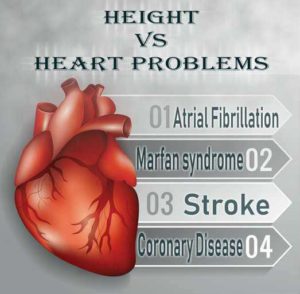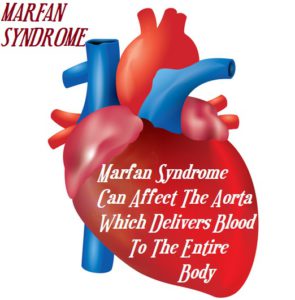I hope you love the products I've recommended below, just a heads up that as an Amazon Associate, I earn from qualifying purchases. This means I may earn commissions on products bought via links on this page.

But when it comes to heart disease and other heart problems, the tall person seems to have drawn the shortest straw. While this is all based on studies previously done, it is a little frightening to read as a taller person.
However, studies are just that. These are not based on your individual circumstances, nor your height. Many external influences affect each and every one of us. That is why we are all unique and being tall doesn’t necessarily make you at risk of heart problems, in my opinion anyway.
If you’re reading this because you are worried about something affecting your health, you should always consult your Doctor first and foremost. Like I said, these are studies and are in no way a diagnosis.

Heart Conditions Found To Affect Tall People
Taller people can be prone to suffer from a particular sort of irregular heartbeat known as Atrial Fibrillation (AF) according to this study on NCBI.This condition is when your heart beat is all over the place and it beats at a rapid pace.
So much so that a persons heart with Atrial Fibrillation can almost be double that of a persons heart rate without the condition. 60-100 beats per second vs 100-180 beats per second for someone with AF. This condition also increases the chances of having a stoke, so it is certainly a serious condition.
Because height has been found to be an influence on this condition, its important for a taller person to watch out for the symptoms. As well as understanding that AF can be classified into 3 categories:
- Paroxysmal: When it comes on in short bursts quickly over a short amount of time and often can be left untreated.
- Persistent: This can be very random, but last days or even weeks before disappearing.
- Chronic: This is more of a permanent case of AF because your heart rate can’t be brought down without treatment. Treatment controls the ongoing issue of irregular heart beat.
Symptoms Of This Heart Condition
While Atrial Fibrillation can be a once off, it’s always advisable to seek medical attention. It’s also not uncommon to have AF and not even know it. So if you have any symptoms, you should always get checked by your Doctor. That is when he/she may recognize the unusual heart rate.
- Heart Palpitations where you become aware of your heart beat without intentionally trying to hear it. Pounding out of your chest essentially.
- Chest Pains
- Dizziness and short of breath.
- Tiredness for no reason.
Tall People & Marfan Syndrome
According to the Mayo Clinic, tall people have greater odds to get Marfan syndrome which is a disorder associated with collagen and connective tissue. These disorders may occur because of problems in the valves of the heart and the abnormal happenings in the aorta. However this is typically an inherited condition.
The biggest concern with Marfan syndrome is that it can affect your largest blood carrier, the Aorta, which distributes blood to the rest of the body. While it can be a life threatening condition, it can also be mild and treated with medication to reduce your blood pressure.
However it’s likely that some precautionary surgery may be involved eventually to repair the Aorta. Being tall slightly affects your blood pressure so it’s a very good idea to monitor this regularly.
Symptoms Of Marfan Syndrome
Because Marfan Syndrome can affect pretty much your entire body from issues with your Aorta distributing blood, symptoms can vary. But nonetheless, here are some common symptoms to be aware of:
- MF is passed down in genes and has been linked to height. So being tall is certainly a symptom and usually with a slender build and longer arms than proportional.
- Eye problems established at a young age.
- Foot and back pain are often associated with MF.
- Curved spine which can cause the chest to pop out or even sink inwards.
- Unwarranted stretch marks visible on the skin.
Does Height Affects Your Heart
While it appears being tall is pretty depressing in terms of heart problems, further studies have shown heart problems associated with being short as well. A 2015 study shows that shorter individuals are likely to suffer from coronary heart disease more frequently. This study measured 65,066 people of different heights. So what does this mean, all humans are destined to have heart problems?.
Are Studies Accurate?
Notwithstanding these studies spanning several lots of samples, the correlation between height and health is a mystery – about how there is a relationship between the two.At the end of the day, anyone regardless of their height can fall the victim of heart problems.
The issue short’ and tall’ varies across lots of studies in relations to population and gender under study. For example, Dutch people are taller by an average of 8 inches. Doctors know this so perhaps they cannot account for the correlation between height and the risk of getting heart disease.
External Factors Besides Your Height

The studies mostly depend on patients’ memories. There are many environmental factors that influence the growth of human at all state stages of development. Including puberty when a child can grow significantly taller in their teen years as a result. By this, it becomes hard for research to assign any one set of factors responsible for increasing the risk. It may be the environmental factors including nutrition or the height.
A meta-analysis of 52 studies was done in 2010 on three million individuals. The analysis shows that individuals with a short stature run a higher risk of deadly heart disease than compared to taller ones.
However, don’t get disheartened. A recent study shows that the primary reason is genes. There are close to 180 genes that go together to determine your height. Some of them make you short and it may result in getting LDL cholesterol and triglycerides that can lead to artery-clogging.
Disprove Your Genetic Structure
Thus, there is a correlation between the height of the individual and heart disease shown in these various studies, which remarkably still remains unexplained. The risk of heart problems as a tall person can be mitigated taking care of certain aspects in your life. If a certain gene has you worried, for example Marfan Syndrome, then it makes sense to proactively seek advice and demonstrate behaviors that better your chances against this gene.
Basic Tips To Better Heart Health
Taking care of your heart and your health should always be your number one priority. But life has a habit of throwing spanners into the mix and we can often forget to look after our health. So here’s a quick refresher to get your brain ticking over.
- Avoid the consumption of tobacco.
- Control cholesterol level.
- Make sure your blood pressure is under control.
- Exercise regularly. Manage weight gain; follow doctor’s advice. Moderate exercise for not less than 30 minutes daily will help.
- Consume healthy diet such as vegetables, fruits whole grains nuts and those with low sodium.
Heart problems for tall people, though are somewhat connected, they can definitely be mitigated with proper modification in lifestyle.




